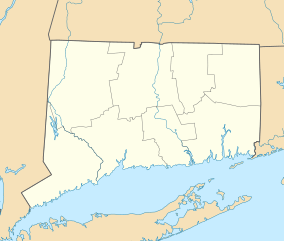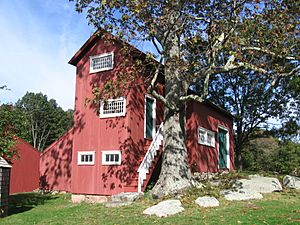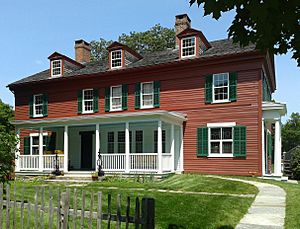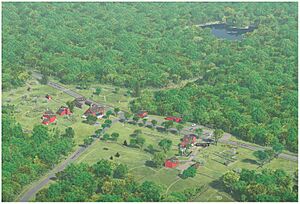Weir Farm National Historical Park facts for kids
Quick facts for kids Weir Farm National Historical Park |
|
|---|---|
|
IUCN Category III (Natural Monument)
|
|
| Location | 735 Nod Hill Road Fairfield County, Connecticut, United States |
| Nearest city | Wilton, Connecticut |
| Area | 60 acres (24 ha) |
| Established | 1990 |
| Visitors | 34,802 (in 2014) |
| Governing body | National Park Service |
| Website | https://www.nps.gov/wefa/index.htm |
Weir Farm National Historical Park is a special place in Ridgefield and Wilton, Connecticut. It celebrates the life and art of American impressionist painter J. Alden Weir. Many other famous artists also visited or lived here, including Childe Hassam, Albert Pinkham Ryder, John Singer Sargent, and John Twachtman.
Weir Farm is one of only two places in the National Park Service dedicated to visual arts. The other is Saint-Gaudens National Historical Park. Both parks have programs where artists can live and work for a month. More than 150 artists have stayed at Weir Farm.
The park also has a "Take Part in Art" program. This lets visitors create their own artwork right there. In 2020, Weir Farm was featured on a special America the Beautiful Quarters coin.
Contents
The Story of Weir Farm: A Home for Artists
In 1882, J. Alden Weir was looking for a quiet country spot. He chose a beautiful, hilly farm in Branchville, part of Ridgefield. He bought the 153-acre farm for just $10 and one of his paintings!
Weir and his artist friends painted many pictures of the local landscapes. These paintings show the beauty of Ridgefield and the nearby countryside.
Passing Down the Artistic Legacy
After J. Alden Weir passed away in 1919, his daughter, Dorothy Weir, took over the farm. Dorothy was also a talented artist. She married sculptor Mahonri Young in 1931. Mahonri built a second art studio on the farm.
Artist Sperry Andrews became good friends with Mahonri Young. Sperry spent years painting at the farm and keeping Mahonri company.
Saving Weir Farm for Future Generations
After Mahonri Young's death, Sperry Andrews bought the property. Sperry and his wife, Doris Andrews, worked hard to save Weir Farm. They teamed up with Cora Weir Burlingham, a relative of J. Alden Weir.
Their efforts led to the U.S. government making it a National Historic Site in 1990. Before this, the land was almost sold off for houses in the late 1980s. The Trust for Public Land helped buy back the land. They worked with the Weir Farm Trust and the State of Connecticut to protect it forever.
Sperry and Doris Andrews lived on the farm for the rest of their lives. They often gave tours of the studios to visitors.
Restoring the Park for Visitors
After Sperry and Doris passed away, the park was carefully restored. The two artist studios and the main house were brought back to how they looked long ago. In May 2014, these historic buildings were opened to the public again.
Today, the park has 16 buildings on 60 acres of land. There's also a hiking trail for visitors to enjoy. National Park Service rangers offer tours and share stories about the artists.
In 2021, the site was renamed from a National Historic Site to a National Historical Park. This change recognized its importance even more.
Artists Who Called Weir Farm Home
Many talented artists lived or visited Weir Farm over the years. They found inspiration in its beautiful surroundings.
- Spero Anargyros
- Wilfrid de Glehn
- J. Alden Weir
- Dorothy Weir
- John Ferguson Weir
- Mahonri Young
- Childe Hassam
- Albert Pinkham Ryder
- John Singer Sargent
- John Twachtman
More to Explore
- National Register of Historic Places listings in Fairfield County, Connecticut
- Historic Artists' Homes and Studios
 | Selma Burke |
 | Pauline Powell Burns |
 | Frederick J. Brown |
 | Robert Blackburn |






